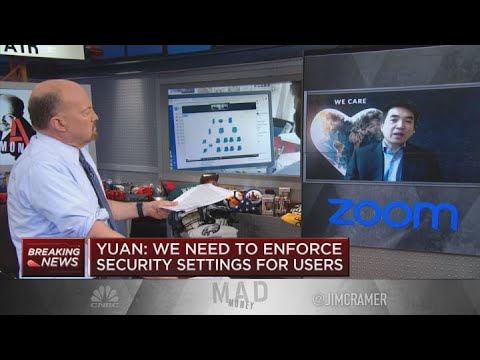Command Palette
Search for a command to run...
CUHK Used Zoom for Exams, but Was Hacked and Disseminated With Indescribable Content

During the period when video conferencing software was reused, its security issues have always been the focus of attention of users such as enterprises and universities. Recently, the Chinese University of Hong Kong revealed that several foreigners hacked into the school during the Zoom exam and played indescribable content, causing the exam to be interrupted.
It seems that Zoom’s security risks have not been resolved yet, and it was hacked again recently.
According to a student from the Chinese University of Hong Kong (hereinafter referred to as "CUHK"), on April 27, CUHK was hacked by hackers while using Zoom for a remote exam, and adult videos were played in the chat room. As a result, the exam could not proceed as usual.
During the exam, an uninvited guest suddenly broke in.
Due to the impact of the new coronavirus pneumonia, not only office and class work have moved online, but exams in many schools are also conducted remotely.
On the morning of April 27, CUHK held a general education exam via Zoom.About 10 minutes after the exam started, several Japanese and Indian people suddenly joined the chat room.And there were Indians who kept imitating the lecturer's accent.
Some students said that people kept saying swear words like "dxxk, fxxk" etc.Some people even used the "share screen" function to play adult videos and Indian music videos in the chat room.As a result, students are unable to take the exam as usual.

The lecturer then immediately suspended the exam and asked the students to turn off Zoom, turn on the camera, show their student ID cards, and then submit the exam answers. Some students were worried that their personal information had also been seen by these hackers.
Some students criticized the incident and said it affected their mood for the exam.Some students also denounced Zoom for not only having security loopholes, but also being "extremely open."

Some students also felt depressed. In order to concentrate on the exam and not be affected, they turned on the mute mode at the beginning. However, after answering the questions seriously for 30 minutes, they found that they had already been moved out of the Zoom meeting room by the lecturer.
CUHK and Zoom responded: We are working hard to resolve the issue
CUHK responded:
“We have learned about the incident from social media platforms and relevant departments. We are currently following up and will maintain close communication with the students.
The spokesperson pointed out that since the use of Zoom for teaching began on February 17,Keep in touch with suppliers.Communicate on issues such as cyber security and data privacy to obtain advice and solutions in a timely manner.It was updated again on the 23rd of this month, uploading an introduction to the secure meeting settings function issued by Zoom.”
However, just four days after the update, this incident happened in the exam on April 27.
Zoom has also made an official response to the media on this matter:
“We regret incidents of this type. Zoom strongly condemns this behavior.We have recently updated a series of features to help our users secure their meetings more easily.
We have enabled meeting passwords and virtual waiting room settings by default for users enrolled in the K-12 plan, as well as free and single Pro users. We have also updated the default screen sharing settings for users enrolled in the K-12 plan.Make sure only teachers can share content in class.
We have reduced the visibility of the Zoom Meeting ID for all users to prevent users from accidentally sharing meeting materials with others. We have also added a new ID in the Zoom Meeting Controls tab for all hosts.A new "Security" tab has been added to give them easier control over security features in meetings, including actions like removing participants and locking the meeting.
Through the training courses and webinars we offer, including weekly privacy and security webinars held by Zoom CEO Eric Yuan, Zoom will continue to discuss and research with all users how to better use Zoom to handle daily affairs and how to protect the privacy of Zoom meetings.
We also encourage users to report these types of incidents to Zoom so that we can take appropriate action or report them directly to law enforcement.”
To sum up the responses from CUHK and Zoom, the gist is that we have tried very hard to implement privacy protection measures, but we still cannot prevent the evil hands of hackers. We welcome everyone to reflect and report, and we will strongly condemn it.
Well, it's official.
Zoom has frequent problems, are its competitors secretly happy?
Since it was revealed at the end of March that it privately shared user data, Zoom has frequently been at the center of public opinion due to security risks: false advertising of end-to-end encryption, accounts stolen by hackers and sold at bargain prices, and Zoom bombing becoming a hot word...
Zoom officially announced on April 1 that it will do its best to solve these problems. It not only stopped the development of all new features, but also launched a "bug bounty" program to encourage everyone to find bugs.
For review details, see:

Better at proactively identifying, addressing, and remediating security vulnerabilities
Now, a month has passed, and I wonder how Zoom's security issues have been resolved? Judging from the incident at CUHK, it seems that the progress has not been very good.
However, there is not much time left for Zoom.
Today, as video conferencing software begins to be reused, major giants are also competing for the market. Domestically, there are DingTalk, Enterprise WeChat, Feishu, etc., and overseas there are Teams, Cisco Webex, Skype, etc. Facebook also quickly launched the free video conferencing platform Messenger Rooms.

When Zoom’s security risks were exposed, the University of Hong Kong and various schools in New York announced that they would stop using Zoom and switch to Teams.
Under such fierce competition, if Zoom still fails to solve the security problem, it may lose more users. After all, when there are many choices, users will only choose the better one.
References:
http://news.wenweipo.com/2020/04/28/IN2004280051.htm
https://hk.on.cc/hk/bkn/cnt/news/20200427/bkn-20200427230129876-0427_00822_001.html
-- over--








